Explore a range of efforts from nine varied restaurant chains that promote a level of eco-consciousness.
From the behemoths to the local favorites, chain restaurants keep taking steps to minimize their environmental impact in a variety of different ways. Though these operations don’t claim to be perfect, they do more than pay lip service to the environment. They invest in food, materials, processes and systems that promise to shrink their climate footprint.
McDonald’s
The world’s largest restaurant chain is looking to make a big impact with its sustainability efforts. Its chicken is all antibiotic-free, its Filet-O-Fish sandwiches are made with wild-caught pollock from 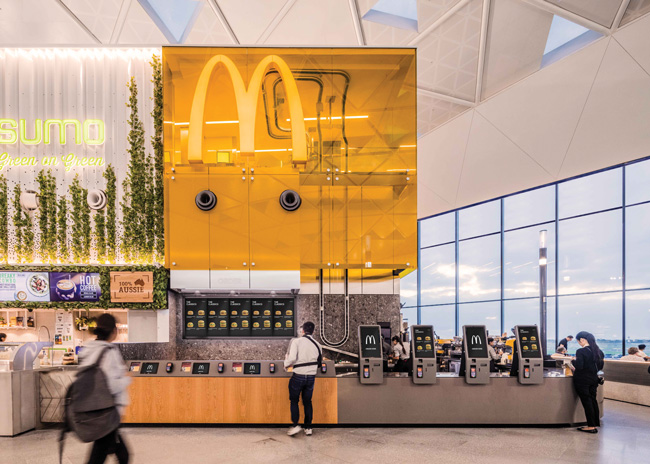 McDonald’s also uses its 800-pound gorilla status to persuade its suppliers to take action.Marine Stewardship Council-certified fisheries, and more than 98% of its beef comes from “deforestation-free supply chains.” The chain is working toward serving this food in 100% “renewable, recycled or certified sources by the end of 2025.”
McDonald’s also uses its 800-pound gorilla status to persuade its suppliers to take action.Marine Stewardship Council-certified fisheries, and more than 98% of its beef comes from “deforestation-free supply chains.” The chain is working toward serving this food in 100% “renewable, recycled or certified sources by the end of 2025.”
To directly address climate change, McDonald’s has committed to having net-zero global carbon emissions by 2050. The company tracks its progress with an enterprise-wide system that measures emissions from supply chains, operations and, of course, restaurants.
McDonald’s also uses its 800-pound gorilla status to persuade its suppliers to take action. As the chain’s climate action website states, “We expect all McDonald’s suppliers to set climate targets, measure emissions and achieve reductions. … This expectation is communicated to suppliers by our sourcing teams and is assessed through CDP [a climate impact nonprofit organization] disclosures and other reporting feedback mechanisms.”
Just Salad
Just Salad, a 75-plus location fast-casual salad chain, recognizes the impact of  Every item on the Just Salad menu includes a carbon label.food on the environment. As the name implies, Just Salad’s menu includes plant-based options that the chain says helps reduce greenhouse gas emissions for each order.
Every item on the Just Salad menu includes a carbon label.food on the environment. As the name implies, Just Salad’s menu includes plant-based options that the chain says helps reduce greenhouse gas emissions for each order.
The concept even empowers guests to make environmentally friendly choices with a low carbon section of its menu. In fact, every item on the Just Salad menu includes a carbon label, which measures the greenhouse gas emissions for each order. What’s more, the chain also sells reusable salad bowls for just $1. Guests who bring in a reusable bowl are rewarded with one free salad topping.
The onus isn’t all on customers, though. The company practices in-store composting and, to minimize waste, donates surplus food to local hunger-relief programs or sells food through Too Good to Go, a third-party app designed to reduce the amount of good food that gets thrown away.
Rubio’s Coastal Grill
This 41-year-old fast-casual seafood chain calls itself the home of the original fish taco. With around 150 locations in California, Arizona and Nevada, Rubio’s talks openly about the ocean as “the inspiration for everything we do” and how that leads to sustainable business practices.
Nearly every seafood option on Rubio’s menu is certified as “Responsibly Managed” according to a third-party certification from the Food and Agriculture Organization of the United Nations. This includes fish that are wild caught, like the pollock from Alaska and mahi-mahi from South America, as well as farmed seafood like shrimp and salmon, which are purchased from farms that are certified for following Best Aquaculture Practices. Non-seafood ingredients are locally sourced, and even proteins offered for a limited time, such as langostino, are sustainable.
Like many chains, Rubio’s sustainability efforts also involve packaging. The company uses compostable and biodegradable to-go containers, salad bowls made from recycled plastic, and paper cups that are certified by the Sustainable Forestry Initiative.
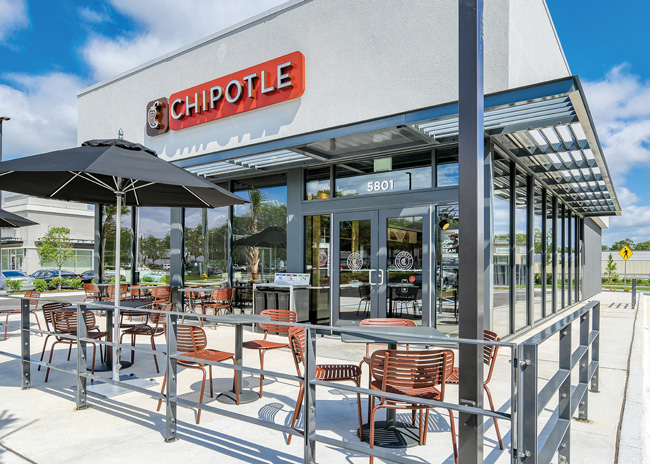 Look at any list of eco-friendly chain restaurants, and Chipotle is almost always near the top.
Look at any list of eco-friendly chain restaurants, and Chipotle is almost always near the top.
Chipotle
Look at any list of eco-friendly chain restaurants, and Chipotle is almost always near the top. That’s no surprise, as the chain has a long history of sustainable business practices.
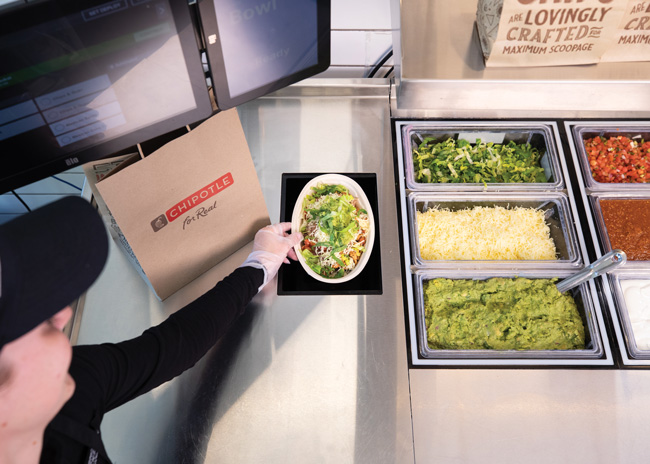 Chipotle has reduced its direct greenhouse gas emissions by 13%.
Chipotle has reduced its direct greenhouse gas emissions by 13%.
Each year, Chipotle purchases tens of millions of pounds of ingredients that are organic, sustainable, transitional (grown on land moving toward organic farming) and/or locally grown produce. When these ingredients don’t get sold, the chain donates them to food charities, in turn.
On the climate front, in 2022, Chipotle purchased 40% of its electricity from renewable sources, while the chain reduced its direct greenhouse gas emissions by 13%.
Such achievements are tied to how transparent Chipotle is about its sustainability goals. For 2023, these included increasing the amount of local produce it purchased by more than 1 million pounds and instituting composting programs in at least 23% of its restaurants. To give these goals teeth, annual performance bonuses for executives can swing 15% (positive or negative) on their performance in these areas.
Farmers Restaurant Group
This Washington, D.C.-based chain operates six Founding Farmers restaurants and one location of Farmers Fishers Bakers. All operate in the polished-casual space.
Like most eco-friendly chains, the company has built the environment into its business practices. The corporate structure makes it majority owned by groups representing more than 50,000 family farmers. Food is purchased directly from local farms, and menus are designed around local, seasonal crops.
About 90% of the company’s waste is diverted from landfills through recycling and composting programs. Farmers Restaurant Group doesn’t use plastic water bottles or plastic straws, works with suppliers to reduce their packaging and encourages them to adopt reusable plastic totes for deliveries.
The chain also builds its restaurants with sustainability in mind. All locations have LEED and Green Restaurant Association certifications, and the company bills its flagship location as “the first upscale-casual, full-service LEED Gold restaurant in the country.” Practically speaking, that means restaurants are built with features like energy-efficient lighting and HVAC systems, have paint with nonvolatile compounds, and use reclaimed barn wood and wood taken from fallen trees.
Barcade
Barcade is an eatertainment concept with a focus on retro video games and pinball machines. All eight of its locations are certified by the Green Restaurant Association.
The company has taken many steps to earn these certifications. Operating dozens of arcade machines per location means the concept needs a lot of juice. To minimize this impact, the chain uses only wind power or a combination of wind and hydroelectric power, all purchased from local suppliers. As a bar, Barcade serves beer, but only on tap. This, the company notes, is more environmentally friendly than glass bottles and aluminum cans, even if recycled.
The company also composts, has low-flow faucets in restrooms, uses reclaimed materials in construction, and serves food with environmentally friendly disposables.
Barcade puts numbers on these efforts. According to its website, each year the company’s green approach reduces energy usage by more than 600,000 kilowatt-hours, saves 1.4 million gallons of water, and diverts 400,000 pounds of waste from landfills.
Shake Shack
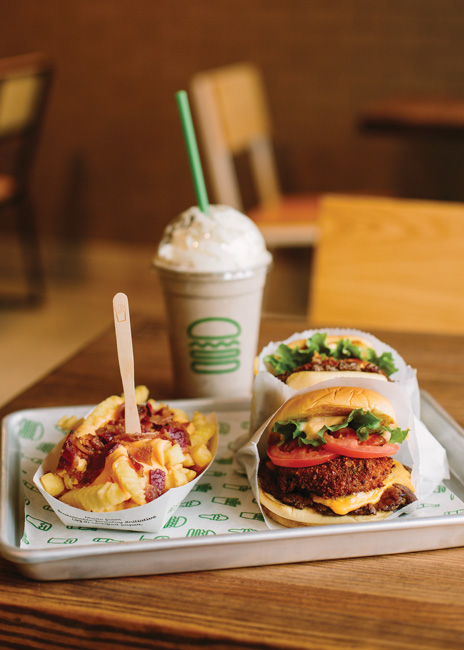 Much of the climate-conscious work at this better-burger chain centers on its facilities. New stores are being built with tankless water heaters, and local furniture suppliers, who are required to plant a tree for every tabletop supplied.
Much of the climate-conscious work at this better-burger chain centers on its facilities. New stores are being built with tankless water heaters, and local furniture suppliers, who are required to plant a tree for every tabletop supplied.
The chain also opened its first building certified by the Green Restaurant Association in 2022. Located in New York City’s Madison Square Park, it features composting, recycled disposables and equipment with low energy/water usage. The company even has a handful of restaurants with rooftop solar panels.
Not everything is about the buildings, though. The chain’s proteins are all hormone- and antibiotic-free. Shake Shack also pays attention to its fryer oil. The company recycled around 2 million pounds of oil in 2022, and in the fall of 2023, it started testing an environmentally friendlier cooking oil made from rain-fed sugarcane plants, which it stated is the world’s “highest yielding crop” in two locations.
Shuckin’ Shack Oyster Bar
Shuckin’ Shack Oyster Bar is a roughly 20-unit seafood chain based in North Carolina that uses only certified Wild 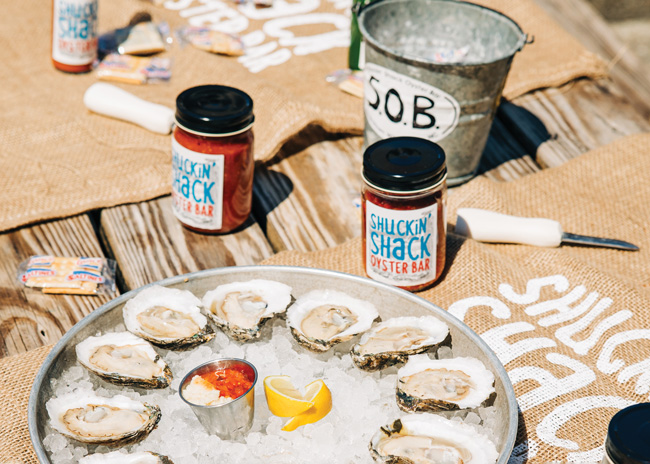 Customers encounter Shuckin’ Shack Oyster Bar’s sustainability commitment in the form of packaging and efforts to limit what ends up in landfills.American shrimp. What’s more, the chain participates in programs that recycle oyster shells for use as reefs in oyster farms and partners with sustainable oyster farms as vendors.
Customers encounter Shuckin’ Shack Oyster Bar’s sustainability commitment in the form of packaging and efforts to limit what ends up in landfills.American shrimp. What’s more, the chain participates in programs that recycle oyster shells for use as reefs in oyster farms and partners with sustainable oyster farms as vendors.
Customers encounter the chain’s sustainability commitment in the form of packaging and efforts to limit what ends up in landfills. As the chain’s website declares, “you will not find Styrofoam, plastic bags or drinks in plastic bottles at Shuckin’ Shack.”
On-site diners can receive straws by request, and even then, these are limited to biodegradable or reusable options.
Other accolades: The chain is a member of the Shellfish Growers Climate Coalition, which seeks to raise awareness of the impact of climate change on shellfish growers and the communities that surround them; participates in the Smart Catch program to promote sustainable seafood through training and education; and is seeking a community-based certification as an ocean-friendly establishment in Wilmington, N.C.



